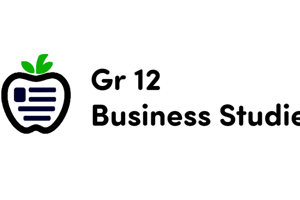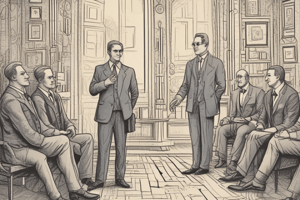Podcast
Questions and Answers
What should you not do with the CB3 study material?
What should you not do with the CB3 study material?
- Use it for personal study
- Follow its guidelines
- Store it electronically
- Lend it to a friend (correct)
What action may be taken if the terms of the CB3 study material are infringed?
What action may be taken if the terms of the CB3 study material are infringed?
- Legal action could be pursued (correct)
- No action is necessary
- A warning may be issued
- Feedback could be requested
Which of the following is true regarding the use of the CB3 study material after the course is completed?
Which of the following is true regarding the use of the CB3 study material after the course is completed?
- It can be photocopied for personal use
- It can be freely shared with others
- It can be archived without restrictions
- The conditions of use remain in force (correct)
What is one of the responsibilities of a user of the CB3 study material?
What is one of the responsibilities of a user of the CB3 study material?
What could happen if you fail to comply with the study material's terms?
What could happen if you fail to comply with the study material's terms?
What is a requirement for the CB3 study material regarding storage or transmission?
What is a requirement for the CB3 study material regarding storage or transmission?
What is the implication of failing to safeguard the CB3 study material?
What is the implication of failing to safeguard the CB3 study material?
Which of the following is a condition of use for the CB3 study material?
Which of the following is a condition of use for the CB3 study material?
What happens to the conditions of use once the course is completed?
What happens to the conditions of use once the course is completed?
What is one of the responsibilities of a user regarding the CB3 study material?
What is one of the responsibilities of a user regarding the CB3 study material?
Flashcards
Copyright Restrictions
Copyright Restrictions
IAI study materials are protected by copyright. Sharing or copying is prohibited.
Unauthorized Distribution
Unauthorized Distribution
Sharing study materials with others is not permitted unless IAI gives specific permission.
Legal Consequences
Legal Consequences
Violating copyright can lead to legal action and/or professional discipline.
Professional Conduct
Professional Conduct
Signup and view all the flashcards
Post-Course Restrictions
Post-Course Restrictions
Signup and view all the flashcards
IAI Study Material Copyright
IAI Study Material Copyright
Signup and view all the flashcards
Consequences of Infringement
Consequences of Infringement
Signup and view all the flashcards
Exclusive Use
Exclusive Use
Signup and view all the flashcards
Professional Ethics
Professional Ethics
Signup and view all the flashcards
Study Notes
CB3 Study Material Copyright
- Study material for CB3 Examination is the copyright of IAI and for exclusive use.
- Without prior authority from IAI, hiring out, lending, giving out, selling, storing, transmitting electronically or photocopying any part of the study material is prohibited.
- Taking care that the study material is not used or copied is essential.
- Legal action will be taken if these terms are violated.
- Disciplinary action may be taken by the Profession or the employer.
- These conditions remain applicable after using the course.
Professionalism & Ethics
- This is a CB3-Business Awareness Online Module.
Contents
- Introduction to Professionalism
- What is a profession?
- Gains from our profession (Members, Clients, Public)
- What do we need to know? (Governance aspects)
- Professional Conduct Standards
- Disciplinary Scheme
Introduction
- Professionalism is a commitment to one's work and service, rather than personal profit.
- It's an ongoing process.
What is a Profession?
- A profession is an employment that is not mechanical and requires learning.
- It requires specialized knowledge, application skills, and sound decision-making.
- Professions are self-regulated.
- They have professional conduct standards.
- Knowledge is kept up to date through CPD (Continuing Professional Development).
- Professions often serve the public interest.
Gains from Our Profession
- Members: Status, income, mutual support, and lobby strength.
- Clients: Clients can be internal or external, requiring special skills, confidential service, integrity. Clients provide input to public debate, and have a statutory role and access to redress.
- Public: Benefits from the professional service.
What Do We Need To Know?
- Oversight of the profession (standards, education, CPD).
- Knowledge of external regulations and self-regulation aspects.
- Governance aspects, professional conduct standards, and the disciplinary scheme.
- Information on certificates of practice, why and who requires them, professionalism courses and continuing professional development.
- Compliance to guidance notes.
Governance Aspects
- Actuaries Act, 2006
- Institute of Actuaries of India Council
- Committees/Advisory Groups
- Disciplinary Process
- Quality Review Board
Professional Conduct Standards
-
In setting up standards, considerable reliance is placed on the conscience of individual members and the collective conscience of all members to maintain the highest standards of conduct.
-
General: Guidance on professional conduct, members must conform to it. Reliance is placed on individual member conscience; it regulates individual members, not firms.
-
Preventative action: To avoid breaches.
-
Professional Standards: The actuarial profession has obligations to serve the public interest. Absolute confidence in member skills, objectivity, and integrity is expected. Members shouldn't act to damage the reputation or integrity of the profession.
-
Standards of Advice: Paying regard to advice, competence and advising only when personally competent.
-
Conflict of Interest: Advising unaffected by personal interest, conflict of interest should be disclosed.
-
Financial Interests: Timely disclosure of financial interest in assignments, regard to other firms. Extreme caution when accepting large financial rewards.
-
Publicity: Public statements should not unfairly give a professional advantage and should be able to be substantiated.
Professional Conduct Standards (additional details)
- Relations with Other Members: Avoid actions hurting member reputation; constructive criticism is acceptable.
- Confidentiality: Information acquired is confidential. An actuary may, by law, be obliged or have the right to disclose confidential information if it's in the public interest;
- Breach of Professional Guidance: Breach of Practice Standard is misconduct. Judged on the breach nature and whether it is material.
IAI Disciplinary Process
- Professional misconduct is defined in the Actuaries' Act.
- A formal complaint leads to an inquiry and investigation by a Disciplinary Committee.
- The committee comprises a presiding officer (President/Vice President of the Council), 2 council members.
- 2 external members nominated by Central Government, experts in law, economics, accountancy, etc.
- A Prosecution Director assists in inquiries.
Inquiries & Penalties
- Disciplinary committee is constituted by the Council to inquire and submit reports.
- Council may proceed according to Section 30 rules if satisfied the member is guilty.
- Other options include further disciplinary inquiry or appeal to prosecution through authority.
- Penalties include falsely claiming to be a member, using institution's name inappropriately, companies engaging in actuarial practice and unqualified professionals signing documents.
Misconduct (Part I, II, III)
-
In relation to members in practice:
-
Allows non-actuaries to practice under own name.
-
Accepting assignments held by other actuaries without communicating.
-
Engaging in non-actuarial businesses.
-
Failing to report errors.
-
In relation to members in service:
-
Accepting fees, profits or gains.
-
Sharing confidential information.
-
In relation to Members of Institute Generally:
-
Not being a fellow member and acting as a fellow.
-
Not supplying information or not complying with requirements and the Act or the rules of the council.
Misconduct - Others
- Being guilty by Civil or Criminal Court for offenses punishable by imprisonment (not exceeding six months).
- Bringing disrepute to the profession or Institute.
- Being guilty of any such offense by a Civil or Criminal Court, with imprisonment beyond six months.
Appellate Authority
- Members aggrieved by Council's orders can appeal within 90 days.
- Appeals' authority can confirm, modify, or set aside Council orders.
- Penalties can be imposed, reduced, or enhanced.
- Cases, with further inquiry may be sent back to the disciplinary committee.
- Other orders may be passed as deemed fit by the Authority.
- Authority should give opportunity to be heard before passing orders.
Quality Review Board
- Board consists of a Chairperson, 4 other members, and 2 members nominated by Central Government and 2 by the Council.
- Board members have relevant experience in fields like law, education, economics, finance, accountancy, and public administration.
- Functions include fixing quality standards, reviewing member service quality, guiding members, and ensuring compliance to various statutory requirements.
Studying That Suits You
Use AI to generate personalized quizzes and flashcards to suit your learning preferences.





